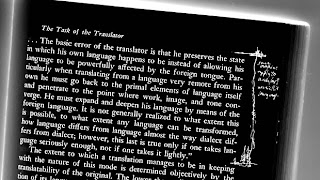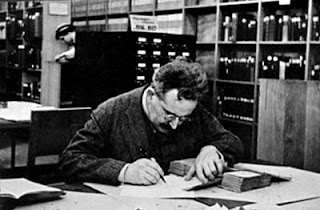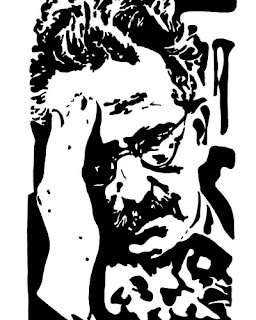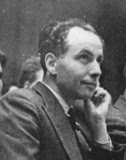
As suggested by mangrovethroatwarbler in his comment on my second post, today I will discuss Walter Benjamin famous essay ‘The Task of the Translator’ (1923). I found it very interesting because it helped me to stand back from the translations I have reviewed in this blog but also from my own translations and to reconsider them in the light of Benjamin’s conception of what the task of the translator should be. Although extremely rich and fascinating, his essay is complex and very elaborate so I will do my best to throw light on the main issues Benjamin raises. I will start with a brief summary of the main ideas developed in his essay as I understood them and will then go into further details.
For Benjamin a translation is part of the ‘afterlife’ of a text and the interpretation of the latter should be informed by a history of reception (which he defines as ‘the age of fame’). As a text in its own right, a translation does not only carry messages; it recreates the value given to the text throughout the ages. Moreover a translation appears as something unique in Benjamin’s words for it has the potential to convey what he calls a ‘pure language’, where the ‘mutually exclusive’ differences among two languages can coexist and where the ‘complementary intentions’ of these languages can be communicated. That is why I think Lawrence Venuti’s description of this essay as an ‘utopian vision of linguistic harmony’ is particularly relevant and appropriate. However it is interesting to look closely at his essay to better grasp the scope of his ideas.
For Benjamin translation is not merely about transmitting messages; as a ‘mode’, it has the potential to achieve what he calls a ‘pure language’, a language ‘released in the translation through literalisms, especially in syntax’. He claims that ‘pure language’ is achievable through this ‘technique’ because ‘languages are not strangers to one another, but are, a priori and apart from all historical relationships, interrelated in what they want to express.’ Thus to demonstrate what he defines as the ‘kinship of languages’ in a translation, the form and the meaning of the original have to be conveyed ‘as accurately as possible’. However this does not mean that the translation has to be a perfect copy of the original because, as he explains, ‘Fragments of a vessel which are to be glued together must match one another in the smallest details, although they need not be like one another.’ In order to produce close renderings of the original, the translator has to transform and adapt the translating language for it to ‘match’ the original.

It is not surprising then that Benjamin decides to quote Rudolf Pannwitz to support his argument for his words are suggestive of this idea: ‘Our translations [German ones], even the best ones, proceed from a wrong premise. They want to turn Hindi, Greek, English into German instead of turning German into Hindi, Greek, English.’ For Pannwitz the translator ‘must broaden and deepen his own language with the foreign one.’ However how is this achievable? According to Benjamin the key to release ‘pure language’ is to differentiate the ‘intended object’, which refers to one same object, from the ‘mode of intention’, which is different from a language to another. He writes: ‘Without distinguishing the intended object from the mode of intention, no firm grasp of this basic law of a philosophy of language can be achieved.’ If I understand it well, I think what he means is that, although a word refers to the same object/thing in both languages, it does not have the same connotations or ‘mode of intention’. If we take the word ‘Resistance’ within the context of ‘l’Affiche Rouge’ for instance, it refers to the same concept in English and in French, namely the act of resisting, but what the word connotes can be quite different: For a French person, it could suggest pride or gratitude, it could remind him/her of the French history and the impact it had on his/her country, whereas for an English person, it can have different connotations because of the way he perceived the French Resistance as an English person; it may make him think about the ‘clichés’ conveyed by the media about this historical period or about the ideas he has formed through his readings on the period. (My example is probably too stereotyped but it helped me to understand what Benjamin meant when talking about the difference between the ‘intended object’ and the ‘mode of intention’). It is interesting to remark that these different intentions could exclude each other; but Benjamin argues that, to the intended object, the two words mean the same thing and thus meaning is ‘complementary’ in the intentions.
As a result, the task of translator is not to ‘assemble’ or express what is to be conveyed since the poet/writer has already done that when writing the original text; the task of the translator rather ‘consists in finding that intended effect [Intention] upon the language into which he is translating which produces in it the echo of the original’ and his/her translation ‘instead of resembling the meaning of the original, must lovingly and in detail incorporate the original’s mode of signification, thus making both the original and the translation recognizable as fragments of a greater language.’ Thus the two texts, both the original and its translation, share what Benjamin calls a ‘vital link’ and from this linguistic harmony arises a greater language, a ‘pure language’. This is the reason why the task of translator is something unique and powerful for Benjamin because until he has released this greater language in his translation, ‘it remains hidden in the languages.’

Personally, I thought that translating a text was something very frustrating since a translator is never able to recreate the original in all its greatness (because languages do not share the same linguistic ‘codes’ and ‘modes of intention’) and that he/she could not avoid losing something in translation. But for Benjamin, translation does not seem to be about ‘losing’ something; On the contrary it appears as a way of ‘gaining’ something through the creation of a text which will not be a pale copy of the original but will have the potential to ‘harmonize’ originally conflicting intentions by transforming the translating language, in order to release a ‘greater’ language.
I found Benjamin’s essay as fascinating as admirable for he deals with all the issues at stake when translating a text while describing and analysing them in all their complexities and subtleties. However I would have liked him to give a few concrete examples to illustrate his concept of a ‘pure language’ and to give examples of how a translator concretely incorporates ‘the original’s mode of signification’ into his/her translation. It is nevertheless interesting to note that for Benjamin the potential of a translation to release this greater language depends on what he calls the ‘translatability of the original’ and it seems that not all the texts are translatable: ‘The lower the quality and distinction of its language, the larger the extent to which it is information, the less fertile a field is it for translation, until the utter pre-ponderance of content, far from being the lever for a translation of distinctive mode, renders it impossible.’ Concerning all the texts which do not meet these criteria, the impression is conveyed that translation ceases to be ‘of distinctive mode’ for it only becomes a mere necessity; Benjamin indeed declares that ‘Where a text is identical with truth or dogma, where it is supposed to be “the true language” in all its literalness and without the mediation of meaning, this text is unconditionally translatable. In such case translations are called for only because of the plurality of languages.’ However I still wonder: how do we evaluate the ‘translatability’ of the original text and according to which criteria? How do we evaluate the ‘quality and distinction of its language’?
To conclude one last point should be made about Benjamin’s analysis of the issues surrounding translation. It is also interesting to observe that for Benjamin, a translation also remains something provisional because ‘in its afterlife […] the original undergoes a change. Even words with fixed meaning can undergo a maturing process’ and in the meantime ‘the mother tongue of the translator is transformed as well’ so ‘what sounded fresh once may sound hackneyed later.’ Thus a translator should consider the significance of a text in its context and in the light on the changes it has to undergo throughout the ages because this text will not have the same impact today than it had fifty years ago for instance. As Benjamin aptly remarks ‘This, to be sure, is to admit that all translation is only a somewhat provisional way of coming to terms with the foreignness of languages.’
REFERENCES:
Benjamin, Walter, ‘THE TASK OF THE TRANSLATOR: An introduction to the translation of Baudelaire’s Tableaux Parisiens’, translated by Harry Zohn, Translation Studies Reader Lawrence Venuti (eds), (USA: Routledge, 1999)
[http://site.ebrary.com/lib/uoh/Doc?id=10100314&ppg=27]
Venuti, Lawrence,Translation Studies Reader, (USA: Routledge, 1999)
[http://site.ebrary.com/lib/uoh/Doc?id=10100314&ppg=27]
















